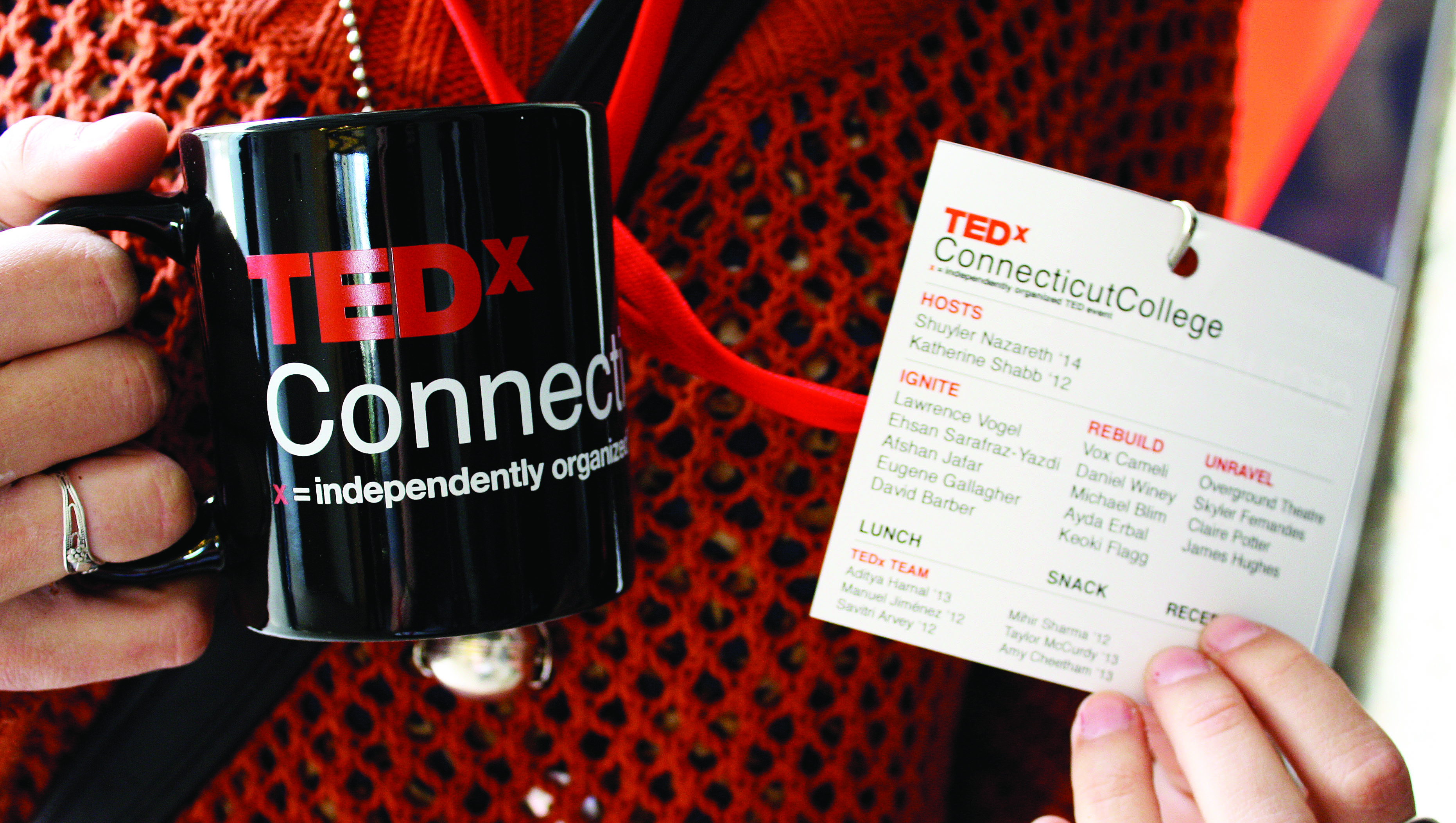This past Saturday, April 14, Conn pulled off one of the biggest conferences in the school’s history with the execution of TEDxConnecticutCollege. The all-day event was the first TED (Technology, Entertainment, Design) Talk ever hosted at Conn; it was an independently organized, student-run TED event that featured Conn professors as well as speakers from outside the college community.
The theme of TEDxConnecticutCollege was “Rethinking Progress,” and perhaps the most progressive aspect of the conference was the fact that it was conceived and organized in large part by Conn students. Throughout the conference, these nine official organizers—with majors ranging from Philosophy to International Relations—emphasized that the TED talk was made possible by countless individuals, companies, and college departments not visible in Evans Hall. Still, the event was clearly student-driven, from the light and sound technicians to the emcees.
The TEDx Talk kicked off at 10 AM in Cummings Arts Center. Lawrence Vogel, a philosophy professor at Conn, was the first speaker of the day—he addressed the origins of progress, citing Jewish messianism and Christian eschatology. Professor Vogel’s talk offered a jumping point for the rest of the conference by addressing where we’ve been in order to determine where we’re going.
From there, the conference seemed to speak to some of our greatest fears and insecurities. Dr. Ehsan Sarafraz-Yazdi, a researcher in the SUNY system, spoke about his cancer research as well as the driving force behind his scientific study: his mother, who died at age 49 of colon cancer. Eugene Gallager, professor of religious studies, delved into the historical significance of and psychology behind our cultural obsession with the end of the world, saying, “In the past 2,300 years, there hasn’t been a year when people didn’t think the world was ending. Nobody’s been right yet, but they persist.”
Several speakers directly or indirectly spoke to climate change and the issue of sustainability, both environmentally and within business models. David Barber, Conn alum and president/co-owner of Blue Hill Farm in New York, described the sustainability of his farm and restaurant, and encouraged the audience to think of Conn as an ecosystem. “No area of this campus can suffer at the expense of another,” said Mr. Barber.
Claire Potter, history professor at the New School, gave an excellent talk on the higher-education crisis in which she accused brick-and-mortar educational institutions of treating students of color as commodities in their quest for so-called diversity. “The diversity of elite institutions does not reflect the diversity of this country,” said Professor Potter, who has also taught as Wesleyan University. “People who teach at colleges like Conn will have to pay attention to the people who don’t come here, as well as the ones who do.”
On the topic of progress, many speakers were forthright about failure as well as success. Dr. Yazdi, before describing his “smart medicine” that delivers targeted therapy to tumors, said, “Over the past fifty years, we’ve had virtually no success in reducing death caused by cancer.” Afshan Jafar, assistant professor of sociology, in her talk entitled “Women’s Bodies,” suggested that plastic surgery processes in Europe and the United States are shockingly similar to genital mutilation in developing countries, a practice most Americans find horrifying and barbaric. Later in the day, Ayda Erbal took the stage. “I’m hardly a poster child for progress. I’m stalled,” said Ms. Erbal, a political science professor at NYU and an independent filmmaker who described the difficulty she felt in assimilating to life in the United States. “You just have to bury your former identity and wait patiently to feel comfortable in another’s language.”
Even while describing gender inequality, the economic crisis, disease, and the end of the world—huge sources of anxiety that have become cultural buzzwords—the TEDx speakers were optimistic about their proposed solutions to the problems. Daniel Winey, for example, gave an exciting and visually stunning talk on the future of cities. Winey is a managing principal at Gensler Architecture and father of Madison Winey ’15. His proposal for dynamic, vertical cities elicited literal oohs and aahs from the audience, who watched intricate blueprints spring up on the screen onstage. He described a massive building that would house 35,000 people and include housing, office space, cultural venues, and “sky gardens”—a new city that would “focus on people, not vehicles.” Mr. Winey was a confident and intelligent public speaker, but clearly self-effacing and kind, starting off his talk by saying, “This is, like, the coolest thing I’ve ever been to.”
The TEDxConnecticutCollege event was broken up into three segments—“Ignite,” “Rebuild,” and “Unravel,” with lunch and snack breaks in between. Several short films, a cappella by Vox Cameli, and a dance performance by the Overground Physical Theatre Company punctuated the eighteen-minute talks. The company had never performed at a TED Talk before, and was grateful to be included. “Dancing here is so much different than it is in the city,” said one dancer. “Today’s audience was so warm and welcoming.”
Those who attended TEDxConnecticutCollege wore nametags that said “Talk to me about ______,” which participants filled in with two interests. Combinations included “Psychology and Culture,” “History and Politics,” and “Anthropology and Cephalopods.” However, it seemed as if everyone was wearing a badge that read “Talk to me about anything.” TEDxConnecticutCollege set out to start a campus-wide conversation, and according to students like Molly Bienstock ’14, “I had some incredibly fulfilling conversations today.”
The future of TEDxConnecticutCollege seems unclear, given the incredible amount of work, time, and resources that go into such an event. However, the campus community was supportive of the event this time around, and many students who attended expressed hopes for more TEDxConnecticutCollege events in the future. Whatever the outcome, this landmark conference set a precedent at Conn—not only for TEDx, but for meaningful conversation in and out of the classroom. •











